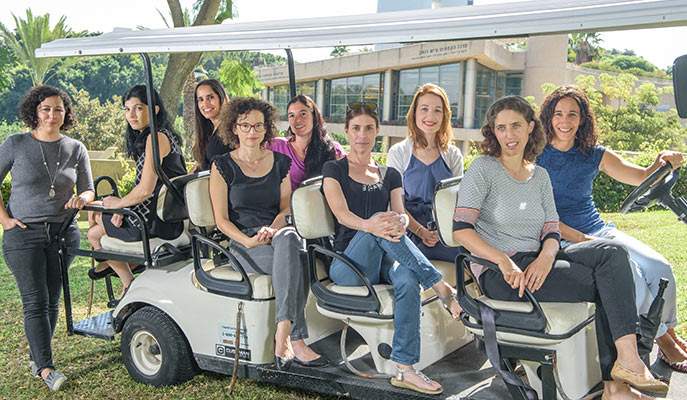Are you a journalist? Please sign up here for our press releases
Subscribe to our monthly newsletter:

It was the summer of 2012, and Dr. Efrat Shema was facing a difficult decision. After completing her PhD under the guidance of Prof. Moshe Oren in the Weizmann Institute of Science, she was accepted to a postdoctoral fellowship at the Harvard School of Medicine. On the one hand, the generous grant she had been offered to continue researching the epigenetic changes that occur in cancer cells was tempting. On the other, undertaking the postdoc would involve moving her husband and young child along with her. Just then, she got a nudge in the “right direction”: She was chosen to participate in the Israel National Postdoctoral Award Program for Advancing Women in Science. “My husband had to give up his job in order for us to move,” she says. “The Award gave us financial security until he could get a new one in Boston. That clinched the deal for us.” Shema has now finished her postdoc, expanded her family (she is now expecting her third) and returned to the Weizmann Institute of Science to head a research group in the Biological Regulation Department.
The Weizmann Institute of Science initiated the program a decade ago, as part of a concerted effort to increase the number of women scientists in its own labs and in the country. The National Postdoctoral Award was intended to help women overcome a formidable hurdle on the way to a top-level scientific career: the postdoc abroad. By the time they have finished their PhD research, many women have already started families, and the decision to pick up and move for at least two years is not one that is taken lightly.
The Award allowed us to stay together as a family
The award of $20,000 a year for two years is thus meant to supplement the grants or scholarship given by the host institute or other foundations. All women who have completed a PhD in the natural or exact sciences in any Israeli institute of higher education are eligible. Since 2007, 116 women – out of about 600 outstanding candidates – have been awarded an Israel National Postdoctoral Award. Prof. Daniella Goldfarb, the Weizmann Institute of Science President’s Advisor for Advancing Women in Science, heads the Award committee, which includes representatives of the other academic institutes in Israel. Some four million dollars have already been given out through the program.
For Dr. Ilana Kolodkin-Gal, who completed her postdoc at the Harvard School of Medicine and today researches biofilms in the Weizmann Institute of Science’s Molecular Genetics Department, “the Award allowed us to stay together as a family.” Dr. Michal Leskes, who returned to the Weizmann Institute after a postdoc at Cambridge University, added a sentiment that was echoed by several of the returning Award recipients: “It is a confirmation of your personal choice to take a path that is by no means an easy one. It helps you feel that you have chosen wisely.” Others reported that receiving the Award was a show of faith in their abilities, a feeling that spurred them on to the challenge of postdoctoral research.
It helps you feel that you have chosen wisely
Of the 69 women who have completed their postdocs with help from the Award, 45 – that is, 65% – have returned to positions in Israeli academic faculties. Of those, 11 now head research groups at the Weizmann Institute of Science: eight in the life sciences, one in chemistry, one in physics and one in mathematics and computer sciences. Goldfarb points out that the percentage of women in faculty positions in the Weizmann Institute of Science at the senior scientist level, the entry point for academic personnel at Weizmann, has never been higher. Fully one-quarter of these positions are held by women – up from 13% a decade ago. The fact that the Institute has, in the past several years, been adding a new generation of outstanding young women scientists – both alumni of the Award program and others – will ensure that the percentage of women in all academic ranks will continue to rise in the future.
Dr. Merav Parter, who completed her MSc and PhD at the Weizmann Institute, and a postdoc at MIT, now investigates distributed systems and wireless networks in the Institute’s Computer Science and Applied Mathematics Department. Parter, who conducted her MSc research in a biology group before moving to computer science, revealed something of what makes her an outstanding scientist in a 2014 interview: “One evening, late in the lab, I had a sudden inspiration on an unconventional way to solve a problem in the research. Surprisingly, it came from a lecture I had heard earlier that day on information theory. It is that brainchild – that sudden spark; the feeling you have the answer to a question that only you thought to ask – that feeling makes it all worthwhile.” She adds today: “The Award, to me, was the proof I needed that the academic world believed in me and that I had a place to return to.”
The percentage of women in faculty positions in the Weizmann Institute of Science at the senior scientist level has never been higher
Ten years on, the Israel National Postdoctoral Award Program for Advancing Women in Science has proved its worth. The return on the investment – for Israel, for the scientific community and for a growing number of women scientists – is inestimable. Dr. Meital Oren-Suissa, who returned to Israel from her postdoc at Columbia University and joined the Weizmann Institute’s Neurobiology Department, puts it this way: “The Award gave me the peace of mind to focus on what I love to do most – research.”
The Israel National Postdoctoral Award Program for Advancing Women in Science is supported by